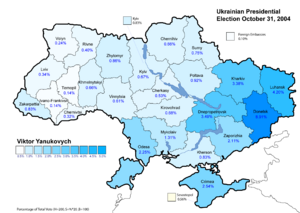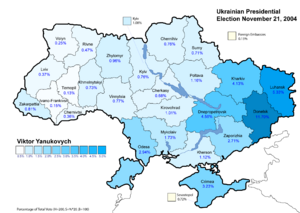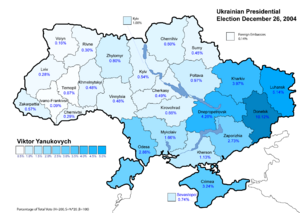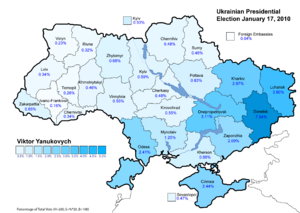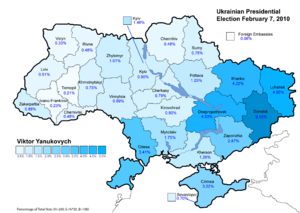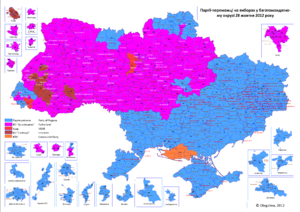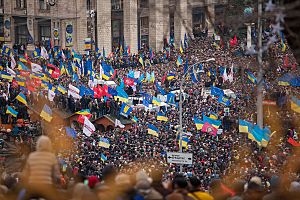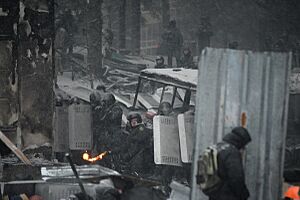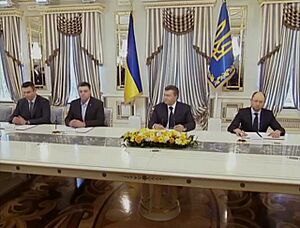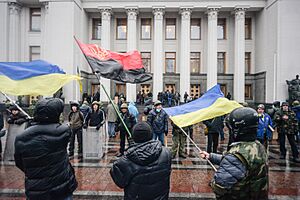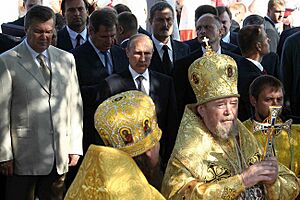Viktor Yanukovych facts for kids
Quick facts for kids
Viktor Yanukovych
|
|
|---|---|
|
Віктор Янукович
|
|
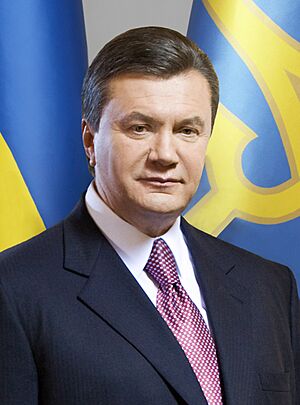
Official portrait, 2010
|
|
| 4th President of Ukraine | |
| In office 25 February 2010 – 22 February 2014 |
|
| Prime Minister |
|
| Preceded by | Viktor Yushchenko |
| Succeeded by | Oleksandr Turchynov (acting) |
| 9th and 12th Prime Minister of Ukraine | |
| In office 4 August 2006 – 18 December 2007 |
|
| President | Viktor Yushchenko |
| Deputy | Mykola Azarov |
| Preceded by | Yuriy Yekhanurov |
| Succeeded by | Yulia Tymoshenko |
| In office 28 December 2004 – 5 January 2005 |
|
| President | Leonid Kuchma |
| Deputy | Mykola Azarov |
| Preceded by | Mykola Azarov (acting) |
| Succeeded by | Mykola Azarov (acting) |
| In office 21 November 2002 – 7 December 2004 |
|
| President | Leonid Kuchma |
| Deputy | Mykola Azarov |
| Preceded by | Anatoliy Kinakh |
| Succeeded by | Mykola Azarov (acting) |
| People's Deputy of Ukraine | |
| In office 25 May 2006 – 12 September 2006 |
|
| Constituency | At-large |
| In office 23 November 2007 – 19 February 2010 |
|
| Constituency | At-large |
| Governor of Donetsk Oblast | |
| In office 14 May 1997 – 21 November 2002 |
|
| Preceded by | Serhii Polyakov |
| Succeeded by | Anatoliy Blyznyuk |
| Chairman of Donetsk Oblast Council | |
| In office 14 May 1999 – 14 May 2001 |
|
| Preceded by | Ivan Ponomaryov |
| Succeeded by | Borys Kolesnikov |
| Deputy Governor of Donetsk Oblast | |
| In office August 1996 – May 1997 |
|
| Governor | Serhii Polyakov |
| Personal details | |
| Born | 9 July 1950 Yenakiieve, Stalin Oblast, Soviet Union |
| Nationality |
|
| Political party | Party of Regions (1997–2014) |
| Other political affiliations |
CPSU (1980–1991) |
| Spouse | |
| Children |
|
| Alma mater | Donetsk National Technical University Ukrainian State University of Finance and International Trade |
| Signature | |
| Website | Viktor Yanukovych, President of Ukraine (Archived) |
Viktor Fedorovych Yanukovych (born 9 July 1950) is a politician who served as the fourth president of Ukraine from 2010 to 2014. He was also the prime minister of Ukraine several times between 2002 and 2007. He was a member of the Verkhovna Rada (parliament) from 2006 to 2010.
Yanukovych was removed from the presidency in 2014 during the Revolution of Dignity. This happened after many months of protests known as Euromaidan. Since then, he has lived in exile in Russia.
He was a member of the pro-Russian Party of Regions. Before working in national politics, Yanukovych was the Governor of his home region, Donetsk Oblast, from 1997 to 2002. He was also the Chairman of the region's parliament from 1999 to 2001.
Yanukovych first ran for president in the 2004 election. He was first declared the winner against Viktor Yushchenko. However, there were many claims of electoral fraud and voter threats. This led to widespread protests known as the Orange Revolution. The Ukrainian Supreme Court cancelled the election results. They ordered a new vote, which Yanukovych lost to Yushchenko.
Yanukovych ran for president again in 2010. This time, he won against Yulia Tymoshenko. International observers said this election was fair.
As president, Yanukovych supported economic improvements and stronger economic ties with the EU. He also favored Ukraine being a neutral state (not joining military alliances). However, during his time in power, some people said that democracy in Ukraine was weakening. This included the jailing of Tymoshenko, less press freedom, and more cronyism (favoring friends) and corruption.
In November 2013, Yanukovych suddenly decided not to sign an important agreement with the EU. This happened because of economic pressure from Russia. Ukraine's parliament had strongly supported signing the agreement. This decision caused huge protests against him, known as the Euromaidan. The protests became very intense in February 2014. Almost 100 protesters were killed by government forces.
Yanukovych and the opposition signed an agreement on 21 February 2014. But he secretly left the capital that evening. The next day, Ukraine's parliament voted to remove him from office. They said he had stopped doing his duties as president. They also set a date for early elections. Even some members of his own party voted for his removal.
Ukraine's new government issued an arrest warrant for Yanukovych. They accused him of being responsible for the deaths of protesters. He fled to Russia. In 2019, a Ukrainian court found him guilty of high treason in his absence. He was sentenced to a thirteen-year prison term. Since leaving office, polls have shown that many Ukrainians consider him one of the worst presidents in their history.
Contents
- Early Life and Career
- Political Career: 1996–2010
- Presidential Campaign and Election
- Presidency (2010–2014)
- Euromaidan Protests
- Removal from Presidency
- Exile
- Academic Degrees
- Personal Life
- Cultural and Political Image
- Interesting Facts About Viktor Yanukovych
- See also
Early Life and Career
Viktor Yanukovych was born on 9 July 1950, in the village of Zhukovka, near Yenakiieve. This area is in Donetsk Oblast, which was then part of the Ukrainian Soviet Socialist Republic in the Soviet Union. He had a difficult childhood. His mother passed away when he was two years old. He was raised by his Polish grandmother.
Yanukovych has Russian, Polish, and Belarusian family roots. His mother was a Russian nurse. His father, Fyodor Yanukovych, was a Polish-Belarusian train driver.
In 1971, Yanukovych married Lyudmyla Nastenko. She was the niece of a city judge in Yenakiyeve.
In July 1974, Yanukovych began studying at the Donetsk Polytechnic Institute. In 1976, he became the director of a trucking division. This was part of a coal-mining company. This job marked the start of his career as a manager in transport. He worked in transport companies in Yenakiieve and Donetsk until 1996.
Political Career: 1996–2010
Yanukovych's political journey started in August 1996. He was appointed as a Vice-Head of the Donetsk Oblast Administration. On 14 May 1997, he became the Head of the Administration, which is like being the Governor.
Prime Minister (2002–2004)
President Leonid Kuchma chose Yanukovych to be prime minister. This happened after Anatoliy Kinakh resigned. Yanukovych started his term as prime minister on 21 November 2002. The Ukrainian parliament approved him with 234 votes.
His government was seen as being close to Russia. However, they also said they supported Ukraine joining the European Union. Yanukovych's government agreed to send Ukrainian troops to the Iraq War. This was to support the United States' fight against terrorism.
2004 Presidential Campaign
In 2004, while he was prime minister, Yanukovych ran for president. He was the candidate for the Party of Regions. Most of his support came from the southern and eastern parts of Ukraine. These regions generally prefer closer ties with Russia.
In the first round of voting on 31 October 2004, Yanukovych came in second. He received 39.3 percent of the votes. The opposition leader, Viktor Yuschenko, had 39.8 percent. Since no candidate got more than 50 percent, a second round of voting was planned.
After the second round, Yanukovych was first announced as the winner. But many people in Ukraine, international groups, and foreign governments questioned the election. There were claims of widespread election fraud. The protests that followed became known as the Orange Revolution. The Supreme Court of Ukraine later cancelled the results of the second round. In the new vote, Yanukovych lost to Yushchenko. Yanukovych got 44.2 percent, while Yushchenko got 51.9 percent.
After losing the election, Yanukovych resigned as prime minister. In 2009, he said he accepted the defeat to avoid violence. He stated he did not want people to get hurt or die.
After the Orange Revolution
After his election loss in 2004, Yanukovych became the leader of the main opposition party. This party was against the government led by Yulia Tymoshenko and Viktor Yushchenko. In 2005, Yanukovych's Party of Regions signed an agreement to work with the Russian political party United Russia.
2006–2007 Elections and Premiership
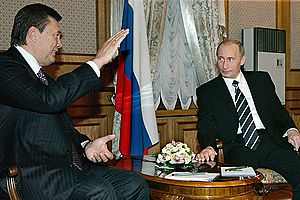
In 2006, Yanukovych's Party of Regions won the 2006 Ukrainian parliamentary election. Yanukovych became prime minister again in August 2006. President Yushchenko appointed him to this role.
Presidential Campaign and Election
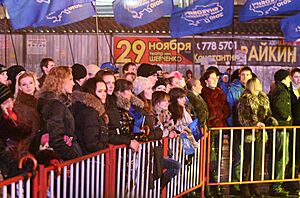
In 2009, Yanukovych announced he would run for president in the 2010 Ukrainian presidential election. His Party of Regions supported him.
The first round of the election was on 17 January 2010. Yanukovych came in first with 35.8% of the votes. He then faced Yulia Tymoshenko in a runoff election on 7 February 2010. Tymoshenko finished second in the first round with 24.7%.
After all votes were counted, the Ukrainian Central Election Commission announced that Yanukovych won the runoff. He received 48.95% of the vote, while Tymoshenko got 45.47%. Election observers from the Organisation for Security and Co-operation in Europe (OSCE) said there were no signs of serious fraud. They called the vote an "impressive display" of democracy. Tymoshenko later dropped her legal challenge against the results.
Presidency (2010–2014)
Inauguration
Ukraine's parliament set 25 February 2010 as the date for Yanukovych's inauguration as president. President Viktor Yushchenko signed a document approving the plans for the event. Yushchenko also congratulated Yanukovych. He wished him success in defending Ukraine's interests and democratic traditions.
Patriarch Kirill of Moscow and All Rus conducted a public prayer service. This was at Yanukovych's invitation, before the inauguration. Kirill also attended the ceremony. Other important guests included Catherine Ashton from the EU and James Jones from the United States.
Yanukovych's predecessor, Yushchenko, did not attend the ceremony. Neither did Prime Minister Yulia Tymoshenko or her party.
First Days in Office
On 3 March 2010, Yanukovych stopped being a member of the Party of Regions. The Constitution does not allow the president to lead a political party. He handed over leadership to Mykola Azarov.
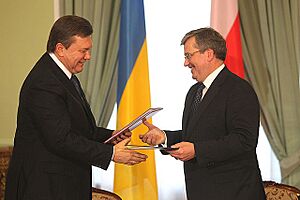
Yanukovych stated that Ukraine's main goal was to join the EU. He also wanted a balanced policy. This policy would protect Ukraine's interests with both Russia and the European Union. He believed Ukraine should be a "neutral state". This means it should not join any military alliances like NATO or the CSTO.
In early November 2011, Yanukovych claimed that "arms are being bought in the country". He also said that "armed attacks on government agencies are being prepared." These claims were met with disbelief by many.
Domestic Policy
Ukrainian lawmakers formed a new government on 11 March 2010. It included the Party of Regions, the Communist Party, and Bloc Lytvyn. This led to the Azarov Government.
Presidential Powers
On 25 June 2010, Yanukovych criticized changes made to the Ukrainian Constitution in 2004. These changes reduced the president's powers. For example, they gave parliament more control over choosing government ministers.
At the 2011 World Economic Forum, Yanukovych called Ukraine "one of the leaders on democratic development in Eastern Europe."
Financial Policy
Tax Code
On 30 November 2010, Yanukovych rejected a new tax code. This code was created by the Azarov Government and approved by parliament. However, it caused large protests across Ukraine. Yanukovych signed a new tax code on 3 December 2010.
Domestic Spending vs. Debt
Yanukovych's Party of Regions wanted to increase social benefits. They also aimed to raise salaries and pensions. In late 2009, a law was passed to increase the minimum wage and pensions. Because of this, the International Monetary Fund stopped its emergency lending program. The IMF said the law broke promises to control spending. During his 2010 presidential campaign, Yanukovych had promised to support this law.
Energy Policy
Russian Gas
Yanukovych believed that gas relations between Ukraine and Russia should follow "market rules." He thought the gas agreement signed in 2009 was very bad for Ukraine. He wanted to discuss gas issues after the 2010 presidential election.
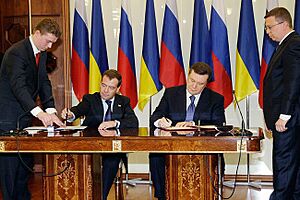
This led to the April 2010 Ukrainian–Russian Naval Base for Natural Gas treaty. This agreement extended Russia's lease on naval facilities in Crimea. In return, Ukraine received discounted Russian natural gas. Yanukovych said that improving relations with Russia did not harm relations with the European Union. He stated, "Our policy is directed to protection of our national interests." In February 2012, he said, "It is not wise to fall asleep next to a big bear", referring to relations with Russia.
Downgrading Uranium Stock
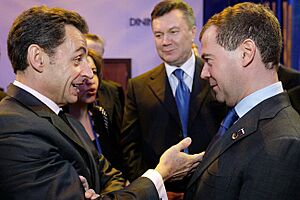
At the 2010 Nuclear Security Summit, Yanukovych announced Ukraine would give up its highly enriched uranium. It planned to change its research reactors to use low-enriched uranium by 2012.
Cultural Policy
East/West Ukraine Unification
Yanukovych stated his goal was to unite Ukraine. He believed there were "no borders between the East and West of the country today." He wanted to create a free trade zone and easier travel rules with the EU. He also stressed the importance of bringing together Ukrainians who fought on different sides in World War II. He expressed hope that Nazi and Soviet totalitarianism would never return.
Holodomor
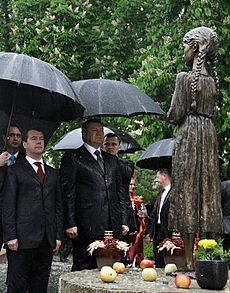
The Soviet famine of 1932–33, known as "Holodomor" in Ukrainian, caused millions of deaths. This happened mostly in Ukraine. It was due to Stalin's government taking peasants' food.
Yanukovych's view on the Holodomor was that it happened and was condemned. He said the international community evaluated the famine. However, he believed it was not a genocide of the Ukrainian people alone. He stated, "The Holodomor was in Ukraine, Russia, Belarus and Kazakhstan. It was the result of the policies of Stalin's totalitarian regime."
Russian as an Official Language
Yanukovych had previously said he wanted Russian to become a second state language in Ukraine. Currently, Ukrainian is the only official language. However, in March 2010, he also stated that "Ukraine will continue to promote the Ukrainian language as its only state language."
He said the status of Russian in Ukraine was "too politicized." He hoped to pass a law on languages that would follow the European Charter of regional languages. This law would make it easier for local languages spoken by at least 10% of the population to become official in that area. This law came into effect in August 2012.
Social Policy
Cuts to social benefits for Chernobyl rescue workers, small business owners, and veterans caused protests in Kyiv in late 2011.
Foreign Policy
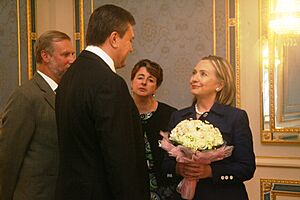
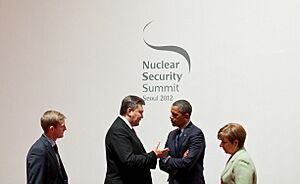
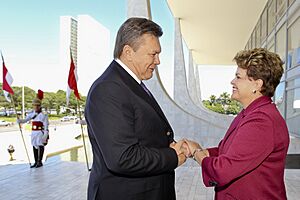
Yanukovych's first foreign trip was to Brussels. He met with EU leaders. During this visit, Yanukovych said Ukraine's status as a member of the NATO outreach program would not change.
During his second foreign visit to Moscow in March, Yanukovych promised to improve relations with Russia. He said ties between Russia and Ukraine "should never be the way they were for the past five years." He also repeated that Ukraine would remain a "European, non-aligned state." This meant Ukraine would not join NATO.
On 3 June 2010, the Ukrainian parliament passed a bill written by Yanukovych. It excluded Ukraine from joining any military bloc. However, it still allowed cooperation with military alliances like NATO. A day later, Yanukovych stated that recognizing the independence of Abkhazia, South Ossetia, and Kosovo went against international law.
On 22 November 2010, the European Council and Ukraine announced a plan. This plan aimed to create a visa-free travel system for short stays. In May 2011, Yanukovych said he would work for Ukraine to join the EU.
On 21 April 2010, in Kharkiv, Yanukovych and Russian President Medvedev signed a treaty. This was the 2010 Ukrainian–Russian Naval Base for Natural Gas treaty. It extended Russia's lease on naval facilities in Crimea beyond 2017 for 25 years. There was also an option to extend it for another 5 years (until 2042–47). In exchange, Ukraine would receive discounted Russian natural gas for several years. Both the Russian and Ukrainian parliaments approved this treaty on 27 April 2010.
Yanukovych said the main goal of his foreign policy was to bring Ukraine "into the European mainstream." At the same time, he wanted to improve relations with Russia. He believed extending the Russian Navy's lease in Crimea was necessary. This would help lower the state budget deficit, as requested by the International Monetary Fund. It would also protect pensions and minimum wages.
2012 Parliamentary Elections
In the 2012 Ukrainian parliamentary elections, Yanukovych's Party of Regions won. They received 30% of the votes. Yulia Tymoshenko's Fatherland party came in second with 25.5%.
Criticism of His Presidency
Reports of Corruption and Favoritism
Yanukovych was criticized for "massive" corruption and favoritism. By January 2013, more than half of the ministers he appointed were from the Donbas region. Or they had spent a key part of their careers there. Yanukovych was accused of favoring people from his region. This was seen in his appointments to police, judicial, and tax services across Ukraine.
Anders Åslund, an expert on Ukraine, described how economic power became concentrated. It was in the hands of a few "elite industrial tycoons." This group included Yanukovych's son, Oleksandr. The Yanukovych family, described as "robber capitalists," bought public and private businesses. They did this at very low prices. This happened during the difficult economic times caused by Yanukovych's policies.
Yanukovych was estimated to be worth $12 billion. Ukrainian officials accused him of taking money from Ukraine's treasury. Authorities in Switzerland, Austria, and Liechtenstein froze the assets of Yanukovych and his son Oleksandr. This was on 28 February 2014, pending a money laundering investigation. Yanukovych denied that he took funds. He said his alleged foreign accounts did not exist.
During his presidency, at least 7,000 Ukrainian companies were reportedly targeted. This was by the powerful group around Yanukovych. These companies were either taken over illegally or forced to pay a regular "tribute." This "tribute" was 30–50% of their profits.
Personal Excesses
Yanukovych left his estate, Mezhyhirya, when he fled the capital. The estate is located in a former forest preserve near Kyiv. He acquired the property in 2007. Critics said this was done through a complex series of companies and deals. Yanukovych did not say how much he paid. However, he called it a "very serious price." Mezhyhirya was estimated to have been sold for over 75 million U.S. dollars.
The property included a private zoo, an underground shooting range, an 18-hole golf course, tennis courts, and bowling. The mansion had a pure copper roof. It was the largest wooden structure ever built by a Finnish company called Honka.
Documents found at Yanukovych's compound showed many expenses. These included $800 for medical treatment for fish. There was also $14,500 spent on tablecloths. An order for light fixtures cost nearly $42 million. Files on people Yanukovych saw as enemies were also found. This included media members. The cost of monitoring the mass media was reportedly $5.7 million for December 2010 alone.
When the former president left, 35 cars and seven motorbikes were left behind. In 2016, a court seized 27 vintage cars from the Mezhyhirya estate. Some of these cars were worth over $1 million.
In a June 2015 interview, Yanukovych said that stories about Mezhyhirya costing Ukrainian taxpayers millions were "political technology." He claimed the estate did not belong to him personally. He also said the ostriches in the petting zoo "just happened to be there." He added, "I supported the ostriches, what's wrong with that?"
Euromaidan Protests
Since 2012, Ukraine and the EU had been working on a free trade and association agreement. In 2013, the Ukrainian Parliament strongly approved finishing the agreement. Yanukovych urged parliament to pass laws so Ukraine could meet the EU's requirements. This would allow the agreement to be signed in November 2013.
However, Russia put pressure on Ukraine to reject the EU agreement. In August 2013, Russia started limiting Ukrainian imports. Ukraine's opposition parties called this a "trade war." They said it was meant to pressure Ukraine not to sign the agreement. Russia also offered better trade terms than the EU and IMF.
On 21 November, a week before the summit, Yanukovych suddenly announced he was pulling out of the agreement. Instead, he would strengthen economic ties with Russia. This decision sparked protests at Independence Square in Kyiv. These protests became known as 'Euromaidan'.
The protesters demanded that Yanukovych sign the agreement or resign. They also called for a return to the 2004 Constitution of Ukraine. This would give more power to parliament over the president. The protests soon grew larger. Protesters opposed what they saw as widespread government corruption, abuse of power, human rights violations, and the influence of powerful business leaders.
During the 'Maidan uprising', Independence Square became a large protest camp. Thousands of protesters occupied it. They protected it with makeshift barriers. The camp had kitchens, first aid stations, and broadcasting facilities. There were also stages for speeches, lectures, and performances. Police attacked the camp several times, which made people even angrier.
Violence increased after 16 January 2014. On that day, Yanukovych signed strict Anti-Protest Laws. The first protesters were killed in fierce clashes with police on Hrushevsky Street. This happened from 19–22 January. In response, demonstrators occupied government buildings in many regions of Ukraine. On 28 January, parliament cancelled nine of the 12 restrictive laws. That day, Mykola Azarov, the prime minister of Ukraine, resigned. He said it was "for the sake of a peaceful resolution" to the unrest.
The deadliest clashes occurred from 18–20 February. This was the most severe violence in Ukraine since it became independent. Thousands of protesters moved from the Maidan towards parliament. They were led by activists with shields and helmets. Police snipers fired on them. Almost 100 protesters were killed. Thirteen police officers also died.
In a June 2015 interview, Yanukovych stated he never ordered security forces to open fire. However, he also said he had not done enough to prevent bloodshed. He claimed that security forces "had the right to use weapons."
Removal from Presidency
On Friday, 21 February 2014, Yanukovych and opposition leaders signed an agreement. This agreement aimed to create a temporary unity government. It also planned to bring back the 2004 constitution. Early elections would be held by December at the latest. That day, the Ukrainian parliament voted 386–0 to bring back the 2004 Constitution of Ukraine. In the afternoon, police left central Kyiv. This allowed protesters to take control. Yanukovych secretly fled the city that evening. He did not sign the measure that would bring back the 2004 constitution.
On Saturday, 22 February, Yanukovych could not be found. Parliament was not told where he was. Parliament held an emergency meeting. The Chairman of parliament, Volodymyr Rybak, resigned that morning. Parliament then elected Oleksandr Turchynov as chairman. Under the 2004 Constitution, which was now in force, the President's powers would go to the chairman if the President resigned or could not do his duties. The acting prime minister, Serhiy Arbuzov, was also missing.
In the afternoon, the parliament voted 328–0 to remove Yanukovych from his post. They also scheduled an early presidential election for 25 May. The resolution stated that Yanukovych had stopped doing his constitutional duties. This "threatens the governance of the state, the territorial integrity and sovereignty of Ukraine." It also mentioned "circumstances of extreme urgency." The vote to remove Yanukovych was supported by all opposition parties. This included 36 deputies from Yanukovych's own Party of Regions. There were no votes against.
The vote happened an hour after Yanukovych said in a televised speech that he would not resign. He later said he was still "the legitimate head of the Ukrainian state." He claimed his removal was a coup d'état (a sudden, illegal takeover of power).
On the same day parliament removed Yanukovych, it voted to release his rival, Yulia Tymoshenko, from prison. She had been imprisoned since 2011. Many saw this as political revenge by Yanukovych. Her release had been a condition for Ukraine to sign a trade agreement with the European Union.
Two days later, Ukraine's parliament dismissed five judges of the Constitutional Court. They were accused of breaking their oaths. They were then investigated for alleged wrongdoing.
Disavowal by Party
Yanukovych was soon rejected by the Party of Regions. Oleksandr Yefremov, the party's parliamentary leader, issued a statement. The party and its members "strongly condemn[ed] the criminal orders that led to human victims." They also mentioned "an empty state treasury, huge debts, shame before the eyes of the Ukrainian people and the entire world."
Fleeing to Russia
Yanukovych left Kyiv during the night of 21–22 February 2014. He first went to Kharkiv. According to the then-governor of Kharkiv Oblast, Mykhailo Dobkin, Yanukovych wanted his stay in Kharkiv to look like "just another presidential inspection tour." He was "desperate to make it look like he wasn't running away."
Yanukovych later claimed he did not "flee anywhere." He said his car was shot at as he left Kyiv for Kharkiv. He then had to move around Ukraine due to fears for his safety and his family's.
According to the Ukrainian State Border Service, Yanukovych tried to leave Ukraine by a charter flight from Donetsk. But border guards stopped him. Russian President Putin and Yanukovych later stated that Russian forces helped Yanukovych fly to Russia via Crimea on 24 February 2014.
After he fled Kyiv, protesters entered Yanukovych's Mezhyhirya Residence. Police and security had left their posts. Ukrainians were shocked by the luxury and extravagance they found at Mezhyhirya. This included a private zoo, many cars, and a large boat.
On 26 February 2014, Russian media reported Yanukovych's presence in Moscow. He reportedly arrived at the Radisson Royal Hotel, Moscow. Then he moved to the Barvikha Sanatorium, a health resort in Moscow Oblast.
The EU association agreement was signed on 29 May 2014, after his removal.
Exile
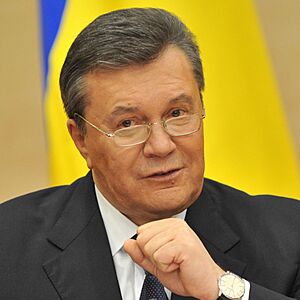
On 27 February 2014, a report stated that Yanukovych had asked Russia to guarantee his personal safety. Russia accepted this request. Yanukovych claimed that the decisions made by the Ukrainian parliament were unlawful. He said he was still the "legal president of Ukraine." He accused the opposition of breaking the 21 February agreements. He asked the Ukrainian armed forces not to get involved in the crisis. In a June 2015 interview, he thanked Russian President Vladimir Putin for "saving his life."
In an April 2014 poll, most people in all regions of Ukraine agreed that Yanukovych was not the legal president of the country.
On 26 November 2015, Yanukovych received a temporary asylum certificate in Russia for one year. This was later extended until November 2017. In October 2017, it was extended for another year. His lawyer said Yanukovych did not want Russian citizenship. He only wanted temporary shelter to return to Ukraine. In 2017, Russian media suggested Yanukovych was living in Bakovka, near Moscow. This was reportedly in a residence owned by the Russian Ministry of Internal Affairs.
Yanukovych's Position on His Removal
In a press conference in Rostov-on-Don on 28 February 2014, Yanukovych stated that all his possessions had been legally declared. The same day, Swiss and Austrian authorities froze his assets and those of his associates. They also started a corruption investigation.
Yanukovych said that an "armed coup" had happened in Ukraine. He claimed he was still the legitimate president because there had been no impeachment, resignation, or death. On 11 March, he said he should return to Ukraine as soon as possible.
He stated he was able to escape to Russia "thanks to patriotic officers." He said they "helped me stay alive." In the press conference, he stated he was still President of Ukraine. He described the new Ukrainian authorities as "pro-fascist thugs." He said they "represent the absolute minority of the population of Ukraine."
He apologized to the Ukrainian people for not having "enough strength to keep stability." He also apologized for allowing "lawlessness in this country." He promised to return to Ukraine "as soon as there are guarantees for my security and that of my family." He insisted he had not told Ukrainian forces to shoot at Euromaidan protesters.
He did not take part in the 2014 Ukrainian presidential election. He believed they were unlawful. He said he was surprised by Putin's silence on the events in Ukraine. He hoped to learn more about Russia's position when he met with Mr. Putin.
Russian Military Intervention 2014
On 28 February 2014, Yanukovych claimed "eastern Ukraine will rise up as soon as they have to live without any means." The BBC reported him saying that military action was "unacceptable." He also stated he would not ask for Russian military intervention.
However, Russia's Permanent Representative to the United Nations, Vitaly Churkin, told the UN Security Council on 4 March 2014 that Yanukovych had asked Russia to send troops. This was to protect civilians. Putin later claimed that if he decided to use armed forces, it would be a legal decision. He said this was because of the appeal from the "legitimate President."
In an interview on 2 April 2014, Yanukovych called Russia's annexation of Crimea "a tragedy." He called the 2014 Crimean referendum "a form of protest." He stated he hoped Crimea would become part of Ukraine again. Yanukovych said he would try to persuade Putin to return Crimea to Ukraine. He blamed the Yatsenyuk Government and acting Ukrainian president Oleksandr Turchynov for Ukraine's loss of Crimea.
March 2014 to December 2021
At a press conference in Rostov-On-Don on 11 March 2014, Yanukovych asked the Ukrainian military to disobey the "criminal orders" of "ultranationalists and neofascists." He called the 2014 Ukrainian presidential election illegal. He also called U.S. financial help illegal. He stated he would like to ask Western supporters of the Yatsenyuk Government: "Have you become blind? Have you forgotten what fascism is?"
On 28 March 2014, Yanukovych asked the Party of Regions to remove him. He was removed on 29 March during a party meeting. Several other senior figures from his government were also removed.
On 13 June 2014, Yanukovych released a video message. In it, he criticized Poroshenko's handling of the unrest in eastern Ukraine. He called it "criminal orders to kill people." Russian media had previously reported that Yanukovych and his wife had moved to Sochi.
On 21 February 2015, Yanukovych gave an interview. He discussed the situation in Ukraine. He promised to return to power as soon as he could.
On 18 June 2015, Yanukovych was officially stripped of the title of President of Ukraine.
On 22 June 2015, Yanukovych was interviewed. He accepted some responsibility for the deaths just before his removal from power.
On 7 December 2015, Yanukovych announced his interest in returning to Ukrainian politics.
On 30 December 2021, Yanukovych filed lawsuits against the Ukrainian parliament. He aimed to overturn his removal from presidential powers.
Russian Invasion of Ukraine
Russia launched a full-scale invasion of Ukraine on 24 February 2022. On 2 March, Ukrayinska Pravda reported that Ukrainian intelligence believed Yanukovych was seen in Minsk, Belarus. They thought Russia intended to declare Yanukovych as President of Ukraine if Russian forces took control of Kyiv.
On 2 March 2022, the Security Service of Ukraine raided the Kyiv District Administrative Court. This was to block Yanukovych's lawsuits. These lawsuits aimed to overturn his removal from presidential powers.
According to Ukrayinska Pravda's sources, Yanukovych left Minsk on 7 March 2022. He then disappeared from public view again.
Russia's Kyiv offensive failed. Its forces withdrew from Kyiv Oblast by 2 April 2022. This seemed to end any chance of Yanukovych being placed in power.
In 2023, President Volodymyr Zelenskyy removed Yanukovych's Ukrainian citizenship.
Academic Degrees
Yanukovych's official website stated he graduated from Donetsk Polytechnic Institute. He studied Mechanical Engineering. He also held a master's degree in International Law. This was from the Ukrainian Academy of Foreign Trade. He was a member of the Academy of Economic Sciences of Ukraine. He also had a PhD in economics.
His resume, published on the europarl.europa.eu website, stated he was a "Doctor of Economics, Professor, Full Member of the Academy of Economic Sciences of Ukraine, Member of the Presidium of the National Academy of Sciences in Ukraine."
Personal Life
Yanukovych was married to Lyudmyla Oleksandrivna Nastenko. They married in 1971. They had two sons, Oleksandr and Viktor. They also had three grandsons. The younger Viktor was a member of the Parliament of Ukraine from 2006 to 2014. He died by drowning in Lake Baikal in 2015. In 2024, Oleksandr received Russian citizenship.
In February 2017, Yanukovych said he had divorced Lyudmyla after 45 years of marriage. Ukrayinska Pravda claims that during his presidency, his wife Lyudmyla lived separately in Donetsk. After the start of the Russo-Ukrainian War, she reportedly moved to Crimea.
In March 2012, Yanukovych stated it was "a problem" for him to speak Ukrainian in 2002. But he said that once he had the chance, he started to do it with pleasure.
Cultural and Political Image
Opponents saw Yanukovych as representing the interests of big businesses in Ukraine. They pointed out that his campaigns received support from Ukrainian billionaire Rinat Akhmetov. His supporters noted that Donetsk Oblast received a lot of investment when he was in office.
Yanukovych had strong support from Russian-speaking Ukrainians in the eastern part of the country. He was disliked and not trusted in western Ukraine. The People's Movement of Ukraine called his election on 10 February 2010 "an attack by anti-Ukrainian forces on our state." They said all legal steps should be taken to stop power from being concentrated in his hands.
On 16 February 2010, Yanukovych stated: "I can say only one thing to those who anticipate that my presidency will weaken Ukraine – that will never happen." Yanukovych refers to himself as Ukrainian. Voters who supported him in 2010 believed he would bring "stability and order." They blamed the Orange Revolution for broken promises, a struggling economy, and political chaos.
Yanukovych was not known as a great speaker. His native language is Russian. This is similar to most people in his home region of Eastern Ukraine. However, he tried to speak Ukrainian better. He admitted in March 2012 that speaking Ukrainian was a challenge for him in 2002. He continued to make mistakes in Ukrainian, which were called "Yanukisms." For the 2004 Ukrainian presidential election, Yanukovych wrote an autobiography. In it, he misspelled his academic degree. This led to people making fun of him.
Other well-known mistakes by Yanukovych include his claim that Anton Chekhov was "a Ukrainian poet" in January 2010. He also forgot to congratulate the Greek-Catholic Ukrainian community on Christmas in January 2011. He also confused Kosovo with Serbia and Montenegro, and North Ossetia with South Ossetia in March 2010.
Yanukovych stated in November 2009 that he respected all Ukrainian politicians. He said, "I have never offended anyone. This is my rule of politics." Despite this, in September 2007, he compared Tymoshenko's performance as prime minister to "a cow on ice." This was likely referring to her skills.
Other examples of strong language used by Yanukovych include calling former president Yushchenko "a coward and a babbler." In a speech in Donetsk during the 2004 election, he referred to Yushchenko's voters as "goats that make our lives difficult." Later, in a TV debate, he explained, "I called the traitors goats. According to the Bible, the goat is a traitor, and there are also rams, sheep." After his escape to Russia in February 2014, during a press conference, he accidentally said, "Ukraine is our strategic partner," confusing Ukraine with Russia. During the same press conference, he also broke a pen in an emotional moment while apologizing to the Ukrainian people.
Opinion polls showed that Yanukovych's popularity dropped after he became president in 2010.
The Ambassador of the European Union to Ukraine, José Manuel Pinto Teixeira, stated in April 2012 that Yanukovych's presidency "fell short of expectations."
In March 2013, The Ukrainian Week claimed that Yanukovych had "failed to meet" his 2010 election promises.
Paul Manafort Consultancy
In December 2004, Yanukovych and his Party of Regions hired American political consultant Paul Manafort as an adviser. He continued in this role through the 2010 Ukrainian presidential election. Manafort's job was to improve Yanukovych's political image after the Orange Revolution.
Manafort hired the public relations firm Edelman to improve Yanukovych's public image. However, Manafort's friends said that Yanukovych "stopped listening" to him after he became president in 2010. Manafort warned him about the results of "extreme" political actions.
Manafort later became the campaign chairman for Donald Trump in 2016. The American FBI began an investigation into Manafort's business dealings while he was working for Yanukovych. American prosecutors claimed that between 2010 and 2014, Manafort was paid over $60 million by Ukrainian supporters. This included Rinat Akhmetov, believed to be the richest man in Ukraine.
In January 2019, Manafort resigned from the Connecticut bar.
Interesting Facts About Viktor Yanukovych
- He has a mix of Russian, Polish, and Belarusian family background.
- His last name, Yanukovych, comes from Belarus. It means "John."
- His Polish grandmother, who was from Warsaw, raised him.
- Many polls show that people think Yanukovych was one of the worst presidents in Ukraine's history.
- There's a funny term called Yanukisms. It refers to mistakes made by Ukrainian politicians.
See also
- 2006 Ukrainian political crisis
- 2007 Ukrainian political crisis
- 2010 Ukrainian presidential election
- 2014 Hrushevskoho Street riots
- Prelude to the Russian invasion of Ukraine
- Alliance of National Unity
 | Jackie Robinson |
 | Jack Johnson |
 | Althea Gibson |
 | Arthur Ashe |
 | Muhammad Ali |


